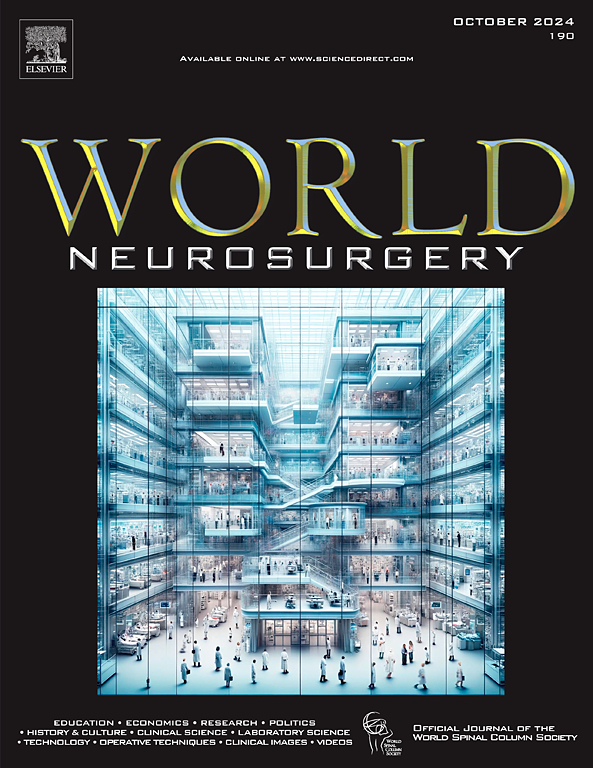The Impact of Ethics and Resources on the Allocation of Traumatic Brain Injury Surgery: A Survey of Neurosurgeons Within Low- and Middle-Income Countries and High-Income Countries
IF 1.9
4区 医学
Q3 CLINICAL NEUROLOGY
引用次数: 0
Abstract
Background
Scarce resource allocation in traumatic brain injury (TBI) care is ethically challenging. We surveyed neurosurgeons about their views on surgical decision-making in TBI in resource-limited settings.
Methods
Neurosurgeons and trainees completed an online survey about surgical decision-making for TBI when neurosurgical capacity is limited. The survey included questions about the impact of patient-level factors (such as the patient's need for surgery or potential for improvement in mortality) and system-level factors (such as operating theater and bed space availability) on decision-making, as well as the perceived fairness of several resource allocation principles when applied to TBI surgery.
Results
The 63 respondents were from low- and/or middle-income countries (27%) and high-income countries (73%, n = 46). Most neurosurgeons (61%, n = 35/57) reported the patient's need for surgery as the primary patient-level driver of decision-making, and operating room space was the main system-level factor (71%, n = 35/49). Neurosurgeons generally thought sickest-first and prognosis were the fairest resource allocation principles.
Conclusions
Respondents generally prioritized their patients' need for surgery, projected benefits, and system considerations such as operating theater capacity in their decision to operate. Respondents prioritized both the sickest patients and those with the best prognosis in the setting of limited surgical capacity. Future research should explore how to work towards an agreed-upon framework for decision-making in resource-scarce settings in a just and equitable way.
伦理和资源对外伤性脑损伤手术分配的影响:对低收入和高收入国家神经外科医生的调查。
引言:在创伤性脑损伤(TBI)护理中,稀缺的资源分配是一个伦理挑战。我们调查了神经外科医生在资源有限的情况下对TBI手术决策的看法。方法:神经外科医生和培训生完成一项关于在神经外科手术能力有限的情况下对TBI手术决策的在线调查。该调查包括患者层面因素(如患者对手术的需求或死亡率改善的潜力)和系统层面因素(如手术室和床位可用性)对决策的影响,以及应用于TBI手术时几个资源分配原则的感知公平性。结果:63名受访者来自低收入和/或中等收入国家(27%)和高收入国家(73%,n = 46)。大多数神经外科医生(61%,n = 35/57)报告患者的手术需求是患者层面决策的主要驱动因素,而手术室空间是主要的系统层面因素(71%,n = 35/49)。神经外科医生普遍认为病情优先和预后是最公平的资源分配原则。结论:受访者在决定手术时通常优先考虑患者对手术的需求、预期收益和系统考虑,如手术室容量。在手术能力有限的情况下,应答者优先考虑病情最严重的患者和预后最好的患者。今后的研究应探讨如何以公正和公平的方式在资源匮乏的情况下建立一个商定的决策框架。
本文章由计算机程序翻译,如有差异,请以英文原文为准。
求助全文
约1分钟内获得全文
求助全文
来源期刊

World neurosurgery
CLINICAL NEUROLOGY-SURGERY
CiteScore
3.90
自引率
15.00%
发文量
1765
审稿时长
47 days
期刊介绍:
World Neurosurgery has an open access mirror journal World Neurosurgery: X, sharing the same aims and scope, editorial team, submission system and rigorous peer review.
The journal''s mission is to:
-To provide a first-class international forum and a 2-way conduit for dialogue that is relevant to neurosurgeons and providers who care for neurosurgery patients. The categories of the exchanged information include clinical and basic science, as well as global information that provide social, political, educational, economic, cultural or societal insights and knowledge that are of significance and relevance to worldwide neurosurgery patient care.
-To act as a primary intellectual catalyst for the stimulation of creativity, the creation of new knowledge, and the enhancement of quality neurosurgical care worldwide.
-To provide a forum for communication that enriches the lives of all neurosurgeons and their colleagues; and, in so doing, enriches the lives of their patients.
Topics to be addressed in World Neurosurgery include: EDUCATION, ECONOMICS, RESEARCH, POLITICS, HISTORY, CULTURE, CLINICAL SCIENCE, LABORATORY SCIENCE, TECHNOLOGY, OPERATIVE TECHNIQUES, CLINICAL IMAGES, VIDEOS
 求助内容:
求助内容: 应助结果提醒方式:
应助结果提醒方式:


